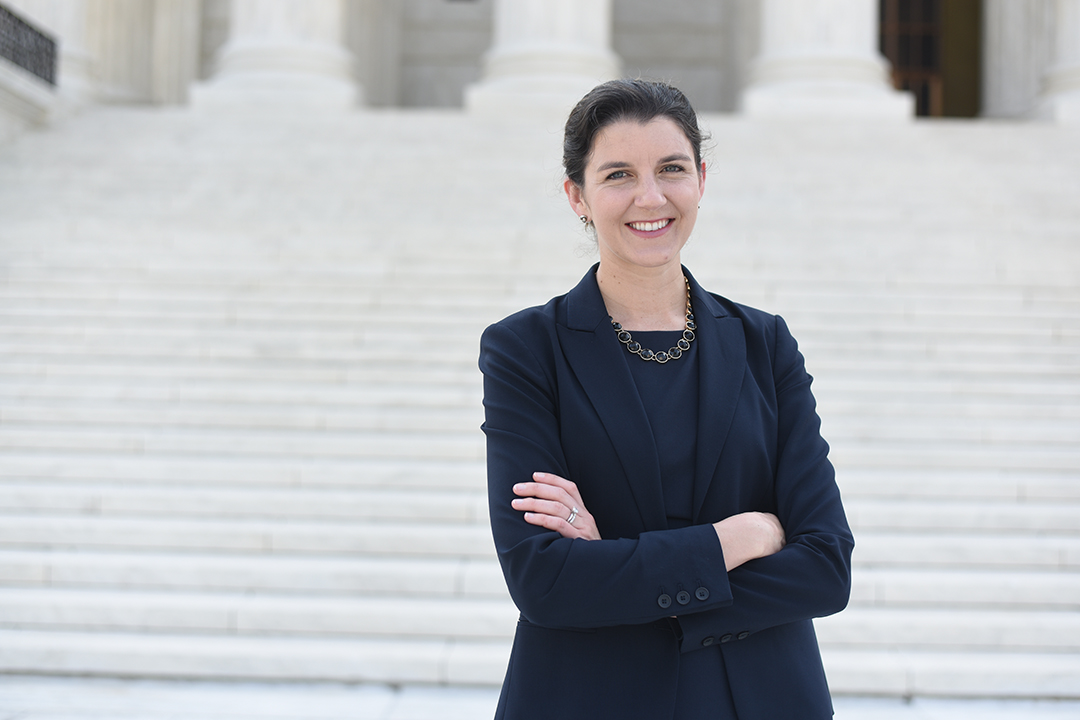Whitney Downs Hermandorfer, JD '15, has been selected to clerk for Samuel Alito, Associate Justice of the Supreme Court of the United States, during October Term 2018. After graduating from GW Law, Ms. Hermandorfer worked at Williams & Connolly, and then commenced clerkships with The Hon. Brett M. Kavanaugh, a Judge on the United States Court of Appeals for the D.C Circuit, who was recently nominated by President Donald J. Trump to fill Justice Anthony M. Kennedy's seat on the Supreme Court, and The Hon. Richard J. Leon, a Senior Judge on the United States District Court for the District of Columbia. Judge Leon also serves as a member of the law school's adjunct faculty and received the award for outstanding adjunct faculty teaching in 2015, which is selected each year by the graduating class.
Ms. Hermandorfer came to GW Law after receiving her undergraduate degree in sociology magna cum laude from Princeton University, where she was co-captain of the Women's Varsity Basketball Team. At GW Law, Ms. Hermandorfer served as the Editor-in-Chief of The George Washington Law Review and received the John Bell Larner Award for obtaining the highest cumulative grade point average in the graduating JD class. She is the first woman to graduate first in her class at GW Law while also serving as Editor-in-Chief of the Law Review in the last 50 years.
GW Law graduates have a long tradition of clerking for Supreme Court justices, beginning with Justice Oliver Wendell Holmes, Jr. in the 1920s. In recent years, graduates have clerked at the Court on average every other year. Most recently, David Fox, JD '12, clerked for Justice Stephen Breyer during the October 2017 Term after clerking for Judge David Barron on the First Circuit. "We are excited and proud that Whitney will continue GW Law's tradition of placing graduates with the Supreme Court," said Bradford R. Clark, William Cranch Research Professor of Law and chair of the faculty clerkship committee. "Obtaining a Supreme Court clerkship is highly competitive as each Justice only hires four clerks per year." Ms. Hermandorfer regards clerking as a great experience for a young lawyer. "Clerking for Judge Kavanaugh and Judge Leon has been a privilege and a great learning experience," Ms. Hermandorfer said. "I could not be more honored to have the opportunity to serve as a law clerk in Justice Alito's chambers."
When it comes to obtaining her clerkships with Judge Leon, Judge Kavanaugh, and Justice Alito, Ms. Hermandorfer credits her success to the support she received from her professors at GW Law, including Professor Clark, who is also a former D.C. Circuit and Supreme Court law clerk; he encouraged and advised Ms. Hermandorfer from the start of her clerkship search through her successful application to clerk at the Supreme Court. Professor Clark praised Ms. Hermandorfer for her approach to pursuing clerkships. "Whitney was flexible and willing to clerk at both the trial and appellate levels," he said. "This put her in the best position to gain valuable experience and ultimately to obtain a Supreme Court clerkship."
Ms. Hermandorfer encourages GW Law students to apply for clerkships at all levels. "I was able to take away so many valuable lessons during each of my clerkships with Judge Kavanaugh and Judge Leon," she said. "During the course of a clerkship, law clerks are not only able to hone their research, writing, and organizational skills, but also to observe arguments and trials by advocates in a wide range of civil and criminal matters." Ms. Hermandorfer believes that her education at GW Law was excellent preparation for her clerkships. She said that the school's emphasis on writing during the first year, as well as upper level elective courses such as Legislation, Federal Courts, and Supreme Court Decisionmaking, were especially beneficial in preparing her to perform the role of a judicial clerk.
Although Ms. Hermandorfer enjoys the substantive work and responsibilities of clerking, she shared that her favorite part about these experiences has been the relationships she formed with her co-clerks and the judges. "Some of the best times during my clerkships were the times spent talking through legal issues with my co-clerks and learning from their approaches and perspectives," she said. "I was also extremely lucky to work for judges who place an emphasis on forming lasting relationships with and mentoring their law clerks."
When Ms. Hermandorfer begins her clerkship at the Supreme Court this summer, she will follow in the footsteps of two other GW Law graduates who have clerked for Justice Alito—Ryan Watson, JD '07, who clerked for Justice Alito on the Supreme Court in 2010-11, and Gary Rubman, JD '00, who clerked for then-Judge Alito on the Third Circuit in 2000-01.


